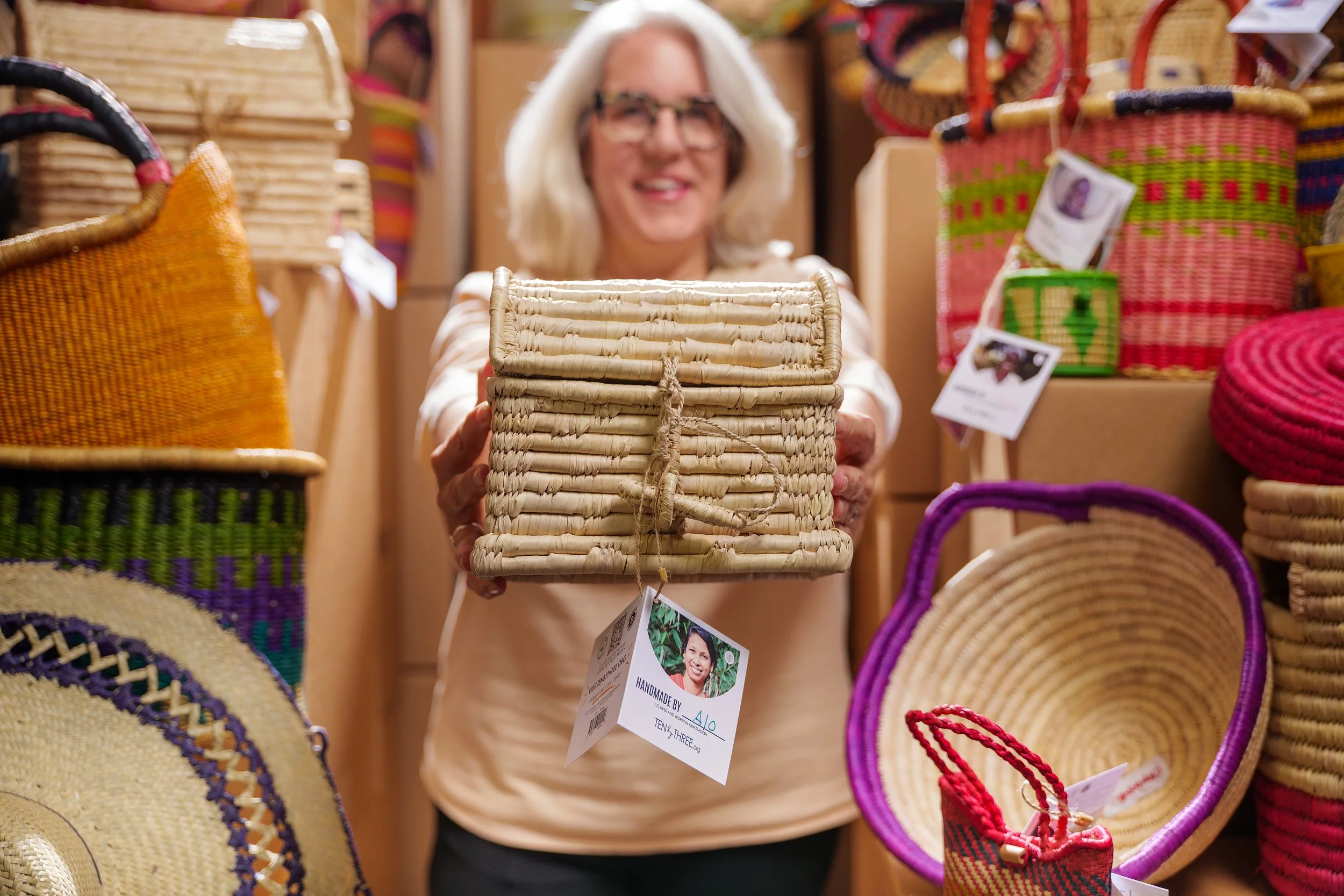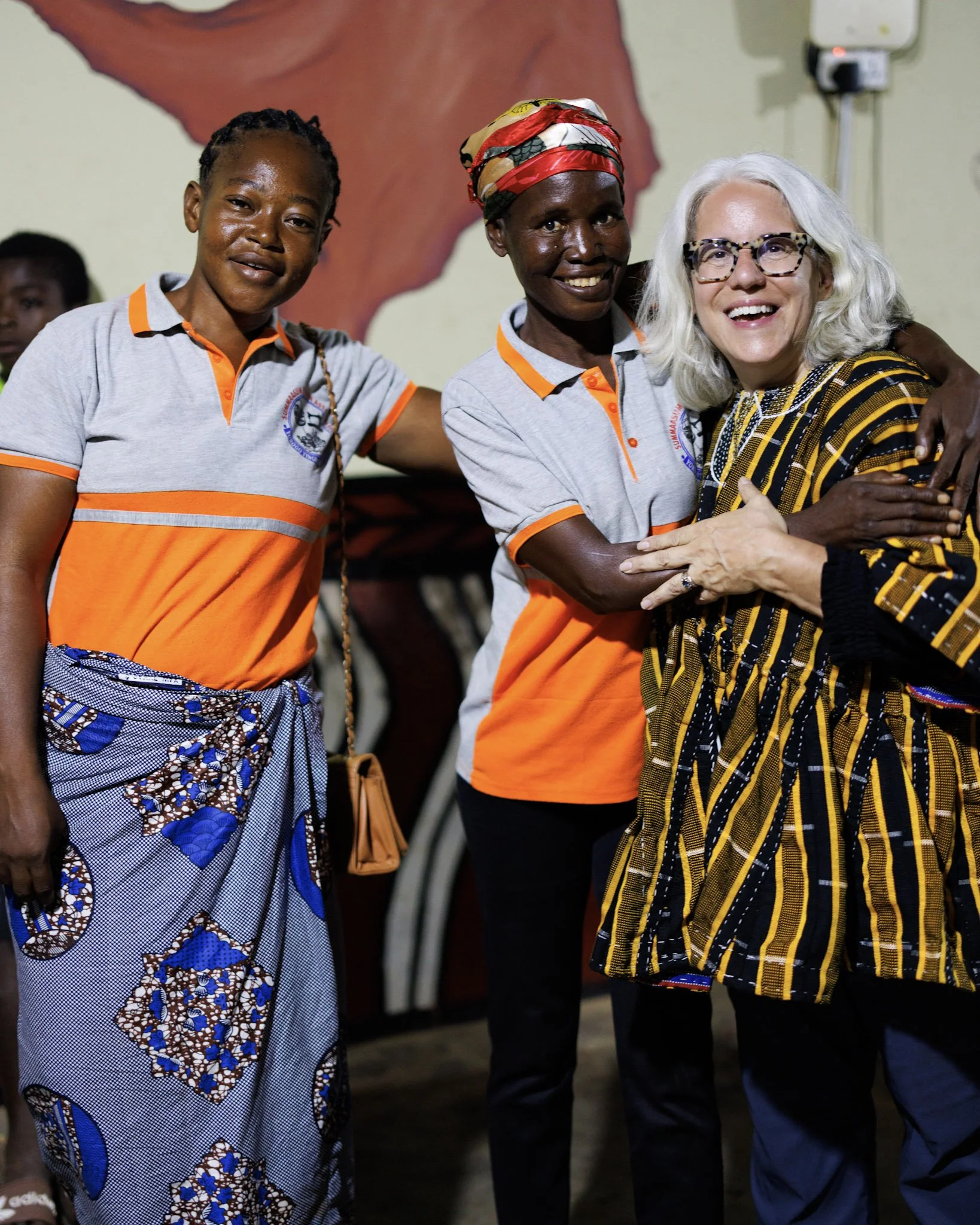Blessings and Baskets
Out of a time of nothing but heartache, Theresa Carrington took her blessings and created a business with women in Africa
by Alexa Beattie / portrait by John Lore
Theresa Carrington knows a thing or two about love: She knows what it is and she knows what it isn’t. More specifically, a bunch of Valentine roses given in the morning by a husband who — by afternoon — had packed his bags and left was definitely not love. But a message on her answering machine a few weeks later certainly felt like it was. “You don’t know me,” the voice said. “But my name is Ruth and I have been instructed to pay your power bill.”
“My life was crumbling.” Carrington said. “I had two young children and suddenly half the income.”
Theresa Carrington
It turned out that Ruth was a member of Carrington’s church. And Ruth was just the beginning. That call was the first in a very long line of kindnesses: Groceries turned up on her step overnight; her lawn was mowed while she was at work. A $100 dollar bill arrived in an envelope with a card that simply said, “For the kids.” The notes and letters came so thick and fast, they “decorated” her living room, then quickly overspilled the little wicker “blessing basket” which had contained them. Carrington read and reread those letters. “People must never underestimate the power they have to touch other people’s lives,” she said. “If we don’t have each other we have nothing.”
Now, two decades later, Carrington not only has touched the lives of countless people in seven countries around the world, but her nonprofit Ten by Three — formerly (and self-explanatorily) called The Blessing Basket Project — has altered those lives dramatically.
“I had no idea how paying it forward would look, but I knew I wanted to try,” she said.
For obvious reasons Carrington had the concept of “basket” in mind, and because of her own lean beginnings in Kansas (as a foster child and then an adoptee), she was also thinking about poverty and ways to alleviate it. It made sense, she thought, to go where poverty in the U.S. was greatest and got in touch with a man named Alton C. Byers — a mountaineering expert with deep knowledge of the Appalachians. She proposed her idea: to employ indigenous people to weave baskets. But Byers shot it down. “The people of Appalachia don’t weave,” he said. “Go to Africa.”
It was still the early days of the internet, but not too early for a global chat room called The Mountain Forum, which Byers had established with participants in all seven of the world’s continents. Carrington’s message said, “If you have need and know how to weave, please contact me.” She had offered to pay $5 per basket — 25 times the going rate (in 2003) of 20 cents.
Overnight, 12 countries had responded. Over the next two weeks around 80 more inquiries had come in. With the $1,000 she had to her name, Carrington made good on her promise and put in orders for a total of 200 baskets.
“But I hadn’t factored in shipping costs,” she said. Nowadays, she laughs about her credit card bill which mounted quite quickly to $40,000. “Back then, I didn’t know!”
In 2004, as a way to get funding, Carrington entered WashU’s Olin Cup — an annual entrepreneurship competition held by the Olin Business School. She won. That notoriety led her to philanthropist Bob Skandalaris of Skandalaris Center for Interdisciplinary Innovation and Entrepreneurship at WashU who gifted Carrington $200,000. But it came with a few conditions: consult his CFO to learn how to run a company, make him Ten by Three’s Founding Sponsor, move out of her basement and hire someone to help. “Make it official.”
The Blessing Basket Project changed its name in 2018. Carrington is pleased with it. Ten by Three, she says, more fittingly speaks to the business model, which stipulates that the nonprofit will buy 10 baskets a month from each artisan, who then must start three small businesses for multiple streams of income. For instance, Sulota Mondol from Bangladesh launched a pigeon enterprise and in doing so, produced four income streams for her family: meat, chicks, eggs and manure. She also has ducks and cows and a sewing machine. The money Ghanaian Adombila Awelgya made from her artistry allowed her to launch five businesses involving crops and four different livestock — cows, chickens, sheep and goats. She soon had money coming in through 43 different channels.
“It’s a formula for creating generational wealth and ending poverty in a sustainable way,” Carrington explained. Having helped almost 40,000 people out of extreme poverty to date, Ten by Three recently achieved Consultative Status with the United Nations. This means the United Nations wants to hear what her nonprofit is doing, what it’s seeing and how its actions relate to the economic and social affairs in the world.
So far this year, Ten by Three has received 55,000 units (baskets) from Ghana; another 16,000 from Uganda, 6,000 from Bangladesh and 2,000 from India. It also works with artists in Togo, Kenya and Madagascar. To date, the nonprofit has sold 44,000 units and expects to double that number. “This year we hope to sell between 85 and 95,000 units based on how strong of a Christmas we have.”
On average, Carrington pays $10 per basket which, in those countries, has purchase power that far exceeds the U.S. dollar domestically. “That money is life-altering,” Carrington said.
While most of those countries allowed Ten by Three to import goods with zero tariff fees under the African Growth and Opportunity Act (AGOA), that has recently changed. Tariffs now range from 10 to 47 percent. “Off the chain,” Carrington said.
A visit to Carrington’s office, on Oakland Avenue by the Saint Louis Science Center, involves a winding walk through canyons of oversized cardboard crates. The air in the warehouse is dry, grassy-smelling, a little sweet. And all around, on surfaces and storage shelves, are baskets of all sizes, styles and colors, each one heartstoppingly perfect in its own way. The people of Uganda weave in sisal and banana leaf while the Ghanaians and Togolese employ elephant grass. In Bangladesh, date palm and sea grass are used. Baskets are made of cane in India, of mahempe in Madagascar. Every one comes with a signed photograph of the artist as well as contact information. If you write them a letter, Carrington said, they will write you back.
The walls of her office, once you reach it, are mosaiced in beautiful, sunshiny photographs of distant places: Carrington with artisans in Ghana, Carrington with artisans in Uganda and Carrington — Dr. Carrington — receiving her Honorary Doctorate of Humanities from WashU in 2019.
“I couldn’t afford to go to college...” she said. “So that was very special. One of the biggest days of my life. I could never have imagined...”
Anyone who’s ever been to Whole Foods — anywhere in the U.S. — will know that Ten by Three baskets are as standard in that grocery store as throw-pillows around a sectional sofa. The baskets can be bought at all 527 stores. It isn’t going to change. Carrington and her team just received an order for spring 2026 — for as many baskets as $500,000 will buy. But the timing is precarious: Ten by Three now has to find a way to fund that order.
“We can’t say, ‘Wait ’til the white lady sells your basket five months from now.’ We have to put the money in [the artisan’s] hand today.”






